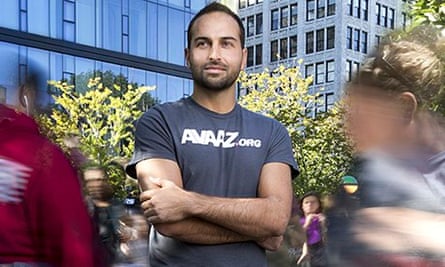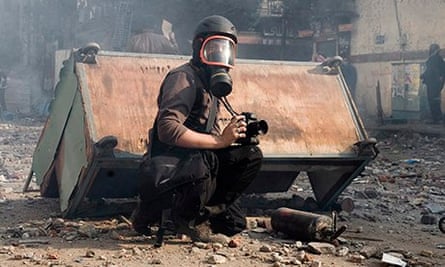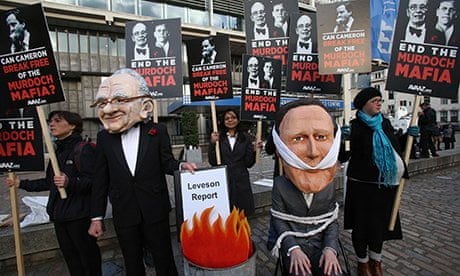There are so many causes. This is forcibly brought home to me outside the Houses of Parliament one day, back in July 2013, where I am trying to locate a "Don't let Burma Become the Next Rwanda" protest. I find it eventually – there is a tableau vivant of tombstones and a pair of people dressed as Burma's president Thein Sein and David Cameron with outsize papier-mâché heads – but I'm distracted from stories of potential genocide by the activities of Stonewall and the London Gay Chorus who are also protesting, just yards away. It's a crucial day for the gay marriage vote, and while the Burma protestors are brandishing placards and chanting slogans it's a tough gig: the London Gay Men's Chorus launches into a multi-part acapella version of "I Need a Hero" and Peter Tatchell has appeared and started dancing.
But then, this is the reality of 21st century protest: it's a beauty parade. A competition for the thing that we all seem to have less of: attention. The TV cameras do show up, though, and a young Rohingya woman from Burma's Muslim minority gives moving interviews to journalists about the terrible human rights abuses her family have endured. And a dozen or so mostly fresh-faced young people show up to offer their support. The protest has been organised by Avaaz, an online activist organisation, and these are Avaazers. They may have just signed an online petition, or "liked" a cause on Facebook, or donated to a campaign – to save Europe's bees from pesticides, or to defend Masai land rights in Tanzania, or to "stand by" Edward Snowden. And, depending on who you believe, they're either inventing a new type of 21st-century protest or they're a bunch of idle slacktivists who are about as likely to start a revolution as they are to renounce their iPhones and give up Facebook.
In just six years, Avaaz – which means "voice" in various languages – has become a global pressure group to be reckoned with. It's a new kind of activism that isn't issue-led, it's issues-led. It's human rights abuses in Burma, or it's the Syrian civil war, or it's threats against the Great Barrier Reef or it's homophobia in Costa Rica. It's whatever its supporters, guided by the Avaaz team, choose to click on most this month. And if you hadn't heard of Avaaz before, it's probably only a matter of time.
Back in July, when I went to the Burma demo, I wrote in my notebook that it had 23 million "members". In September, I interviewed its softly spoken Canadian founder, Ricken Patel, and noted in the transcript that it now had 26 million. By the time I actually sit down and write this in October, I check the site and find it has 27,865,177. And by the time this piece appears in print in November, that number will be hovering around the 30 million mark. If it's a bit shameful that five million people have joined a cause in the time it's taken me to put hand to keyboard, the counter at the top of its website, Avaaz.org, shows that even in the length of time it's taken me to write this sentence, another 172 people have signed up.
But then, being a "member" of Avaaz is not like being a member of Greenpeace. You might have signed a petition, or subscribed to an email. You might not remember doing anything at all. And yet you're still part of what has become a global phenomenon: the rise of online protest – otherwise known as "clickativism". And while its critics dispute what Avaaz has actually achieved – many of what it claims are its greatest successes have been in areas that other organisations have been working on for years – there's no doubt it has become a huge and influential player on the world stage. "For all its bluster, and there's a lot of bluster, it is bloody big," one ex-staff member told me. "And heads of state pay attention, I can tell you that. There's a lot of contentiousness, and jealousy, on the part of traditional charities such as Oxfam, but it raises huge questions about the future of liberal activism."

Avaaz's explosive growth is just one part of what makes it entirely unlike traditional charities or campaigning organisations. Plot its progress on a chart and it looks like a rocket taking off. But it's the product of a networked age and its evolution has been more like that of a YouTube video than the early years of Amnesty. The original business plan – to reach five million supporters in five years – had to be torn up after 18 months. Its growth is exponential: they've gone from nine employees in year one to 100 now (its head office is in New York, but staff are dotted everywhere). When I ask in how many countries, Patel doesn't actually know.
"Everyone is everywhere and everyone is moving all the time. We probably have staff in 30 to 40 countries." And from what I see of the London office, where a desktop PC lies mouldering in the corner like a relic from another era, they're generally hip, young Mac slingers who hold their office meetings on Skype and are as likely to be collaborating on a Google document with a colleague in Brazil for a campaign in Portugal as they are to be working on a UK issue with the person sitting next to them.
Avaaz is both global and globalised and its approach is less bleeding-heart liberal than hard-headed pragmatist. It doesn't launch a campaign – to save fin whales from being butchered, or to free trapped migrant workers in Bahrain, or to bring peace to Palestine – because Patel, or the staff passionately believe in it (though they might). They launch a campaign that they think will fly. It's tried out on a sample of members and then they gauge the response. Patel says it's a way of ensuring that the members have the ultimate power, that they're the boss, not him.
And it saves time: Avaaz doesn't back no-hopers. If it launches a campaign, it throws its resources at it – and a chunk of its $12m budget a year, all donated from individuals – and there's a fair chance it will have an impact. (In 2011, when news wasn't getting out, it armed the Syrian opposition with satellite modems and camera phones; this year, an email and ad campaign, opinion polls and personal approaches to the president succeeded in getting the sentence of a young rape victim in the Maldives who had been ordered to be flogged overturned (though there is not, as yet, peace in Palestine.)
What Avaaz is doing is trying to unlock the secrets of the internet – of what makes one video of a cute kitten falling over go viral, but not another – and to bring those skills to bear not on Justin Bieber's career or Lady Gaga's album sales, but potential genocide, forced rape, species extinction.
"We're like a laboratory for virality. For every campaign we test perhaps 20 different versions of it to see what people want." It tweaks and it tweaks and it tweaks, changing the wording, pictures, call for action, and only then does it send it out on public release. Sam Barratt, Avaaz's head of press, shows me the previous versions of its email about the Burma campaign. "Changing the meme at the top, or the photograph, massively affects the number of clicks. Eighteen versions were tested. People think we just chuck it out there, but there's a huge amount of data sophistry into how we design the campaigns." And, just as Amazon and Google try to predict our behaviour, and adjust their offerings based on our past preferences, so does Avaaz. It uses algorithms to detect things we perhaps don't even know about ourselves.
"It's a tremendously evolving science, internet engagement," says Patel. "But we develop a picture of someone from their previous engagements with us. So, for example, we can see that a certain set of people, based on their previous behaviour, might be interested in starting a campaign, and another set won't be, but may be interested in signing something. We can tailor it to the individual."
Everything is viral now, says Patel, "from financial crises to health epidemics to ideas". And learning the lessons of that and of how to garner attention from some of the most attention-deficient people on the planet – young people with electronic devices – has been Avaaz's masterstroke.
But it's too much for some. It's precisely the sort of "slacktivism" that makes critics of what's called "techno-Utopianism" despair. Why Malcolm Gladwell claimed "The Revolution Will Not Be Tweeted" in a strongly argued piece in the New Yorker in which he claimed: "Fifty years after one of the most extraordinary episodes of social upheaval in American history, we seem to have forgotten what activism is." Evgeny Morozov put it even more baldly in his latest book. To Save Everything Click Here, he called it. The subtitle? The Folly of Technological Solutionism.
Is it a folly? "Liking" a Facebook page isn't going to save the world. But five times as many people in Britain are members of Avaaz than they are of the Labour Party. And 30,000 people donate money to it every month. Money that has been spent on ads and stunts and what Patel claims are "some of the best, most skilled advocates in the public sector today. Advisers to President Obama, and Presidents Lula and Dilma and the prime minister of Japan. There are fairly simplistic online petition organisations out there, especially commercial sites that have zero expertise and understanding of politics, but that's not us."
Visual gimmicks – like the papier-mâché caricatures of Thein Sein and David Cameron – are an Avaaz hallmark. As is its notion of what Patel calls a "Toc". A what? "A theory of change. How do you get from A to B credibly? How is someone clicking through and making a phone call to this leader actually going to change the world? If that's weak, people aren't interested, they don't engage. We always have a very well developed theory of change."
And everything is quantified. This is the science of movement building. "We even have a formula for how we write our emails. We always have forward-looking immediacy. So we say, 'in three days'. Then it allows people to say, 'OK I need to do this in the next three days.' And then we describe a 'crisistunity'."
A crisistunity is another Avaaz-ism. "Though I think we originally got it from The Simpsons," says Patel. "It's a mixture of crisis and opportunity. We're at this extraordinary moment in history. We have the power to wipe out our species. But at the same time, we've had tremendous progress in the past 30 years. We have more than halved global poverty. We've radically increased the status of women. There are tremendous reasons for hope and optimism."
There is something very Avaazian about the crisistunity, I come to think, in that it's borrowed something slick and witty from popular culture and re-purposed it for something which used to be called the Greater Good. And then given it a thick dollop of added earnestness.

Patel is earnest, though not in a hey-dudes-let's-save-the-planet sort of way. Or a I-feel-the-people's-pain of a politician up for re-election. He's thoughtful and reflective and has an impressive CV – he worked as a conflict analyst for organisations such as the UN and the Gates Foundation in places like Liberia and Afghanistan. He isn't a wide-eyed still-wet-behind-the-ears college student. Nonetheless, he does want to change the world. And he believes he can.
Getting cross isn't a very Ricken Patel thing to do but he almost does when I ask him if he's an optimist by nature. "I really don't think I am! I've asked myself that question. I have no respect for naive activism. We take hard positions. When I was working as a conflict analyst I would recommend military action when I thought it was appropriate. I think, honestly, that I'm quite clear-eyes and I think that the fatalism that I see in the world is lazy and unsourced. People assume that cynicism carries with it a kind of expertise and I've never believed that."
It's Avaaz's high ideals and unbureaucratic nature that have drawn a lot of staff to it who were fed up with the strictures of working for big traditional aid agencies. "A lot of the people who work there found it incredibly liberating," says an ex-Avaazer. "You could say, 'This is a mess' on Monday and do something about it by Wednesday." But, there "is something of the cult about it. There's a lot of men working there who think that technology will save the world."
It's had its share of criticism, too. It took an active part in smuggling journalists in and out of Syria but was attacked for over-stating its role in helping Paul Conroy, the photographer travelling with the Sunday Times's Marie Colvin when she was killed, to escape. Others believe there's only a finite amount of empathy to go round, and its success has come at the expense of falling revenues for traditional NGOs.
That Avaaz is a global organisation with global ambitions probably isn't a coincidence. Patel was brought up in rural Canada, west of Edmonton "or Deadmonton as it should be known", the son of a Kenyan-Indian father and an English mother of Russian-Jewish descent, and went to school on a native Indian reservation. And he was, he tells me, "a precocious child". I should say.Who were your heroes, I ask him. He doesn't hesitate: "Dag Hammarskjöld." Dag Who?
"He was the second secretary general of the UN. I read Markings, his diary to himself, and I just think he's a very sincere, public-spirited figure that grappled with a difficult time."
In this, the age of personality, I'd expected something else from Patel, or Ricken, as he is to his staff and supporters. People magazine included him in an article on the world's most eligible "Hot Humanitarians". And when the Economist put him on the cover of their Intelligent Life magazine, his stubble-covered jaw defined by mood lighting, there was more than a touch of Hollywood dreamboat about him. Even Al Gore, the activist's activist, has praised Avaaz as "inspiring". When I interview an ex-Avaazer, she asks me, "Is he still single? When I worked for him, he must have been the most hotly pursued man in New York. I've just been reading Dave Eggers's latest book and he has a character who's a Utopian nerd-god who's trying to save the world and it's Ricken, basically."
But once a quiet Canadian, it seems, always a quiet Canadian, even if he followed the same route into public life as the likes of Ed Balls and Yvette Cooper – PPE at Oxford (where he organised a university-wide protest against tuition fees) and then Harvard School of Government (where he was one of the leaders of a living-wage campaign). Because with all his talk of "journeys" and the fact that he thinks women's rights have changed the world and that he believes his sense of public service is because his own mother "just gave me this tremendous amount of love, just overflowing, unconditional love", he's something of a rare beast: a man in public life who's not afraid of emotions, and yet his proudest achievement for Avaaz is not saving whales or babies or rape victims, it was sticking it to Rupert Murdoch.
Avaaz led a campaign against his takeover of BSkyB and during the Leveson Inquiry, subpoenaed emails showed that "Jeremy Hunt's primary concern was the Avaaz campaign. We knew he was afraid of judicial review. So we hired top-notch counsel and we promised him judicial review. That made him more careful, and then we had our members send 35,000 legally admissible admissions. So he had to hire a team to trawl through them. We knew the [phone hacking] scandal was coming long before it hit, so our strategy was to draw out Hunt's decision until it hit. And it played out beautifully. I don't think we ultimately won on Murdoch. He's in a very good position right now. But it would have expanded his empire by 50% and I'm proud that we helped to stop it."
Were you waiting for a big front-page piece against you? "I'm still waiting for it. I think Murdoch's will come… Everybody told us don't do it. They'll lynch you. It's brand suicide." He shrugs. Maybe slacktivism has its advantages. Maybe Avaaz and its members are less constrained, less scared. Maybe you can save fin whales and Edward Snowden and bring peace to Palestine, too. And in the time it's taken you to read this article, another 500 people or so will have joined Avaaz. To save the world click here.




Comments (…)
Sign in or create your Guardian account to join the discussion